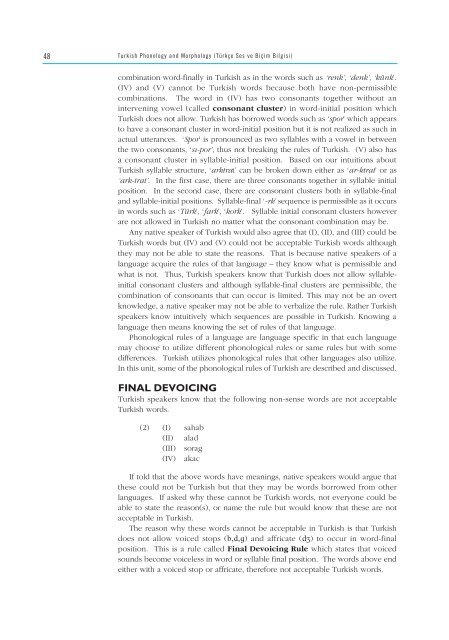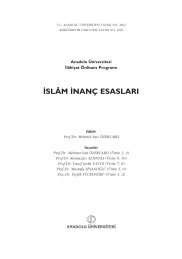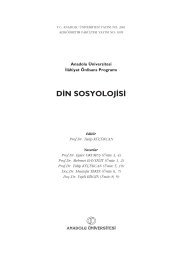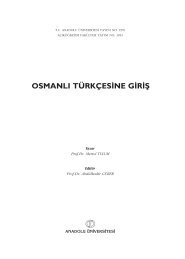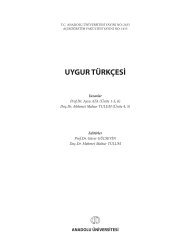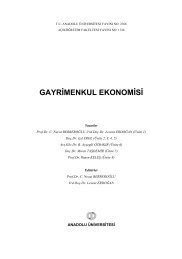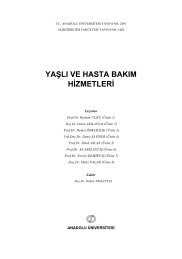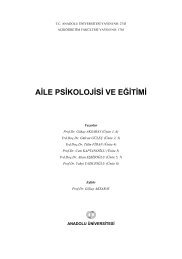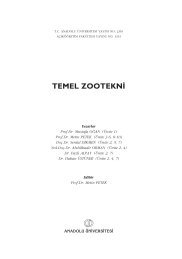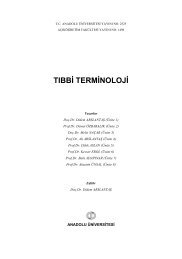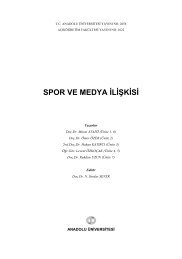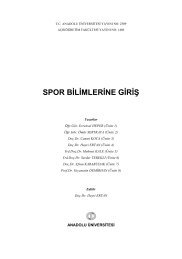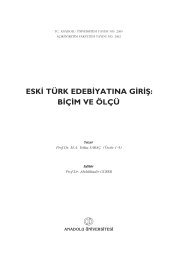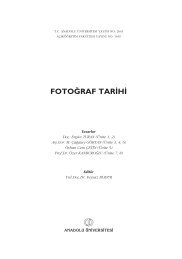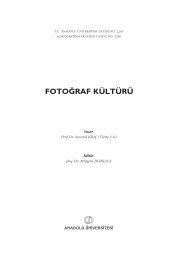turkish phonology and morphology (türkçe ses ve b‹ç‹mb‹lg‹s‹)
turkish phonology and morphology (türkçe ses ve b‹ç‹mb‹lg‹s‹)
turkish phonology and morphology (türkçe ses ve b‹ç‹mb‹lg‹s‹)
You also want an ePaper? Increase the reach of your titles
YUMPU automatically turns print PDFs into web optimized ePapers that Google loves.
48<br />
Turkish Phonology <strong>and</strong> Morphology (Türkçe Ses <strong>ve</strong> Biçim Bilgisi)<br />
combination word-finally in Turkish as in the words such as ‘renk’, ‘denk’, ‘künk’.<br />
(IV) <strong>and</strong> (V) cannot be Turkish words because both ha<strong>ve</strong> non-permissible<br />
combinations. The word in (IV) has two consonants together without an<br />
inter<strong>ve</strong>ning vowel (called consonant cluster) in word-initial position which<br />
Turkish does not allow. Turkish has borrowed words such as ‘spor’ which appears<br />
to ha<strong>ve</strong> a consonant cluster in word-initial position but it is not realized as such in<br />
actual utterances. ‘Spor’ is pronounced as two syllables with a vowel in between<br />
the two consonants, ‘s›-por’, thus not breaking the rules of Turkish. (V) also has<br />
a consonant cluster in syllable-initial position. Based on our intuitions about<br />
Turkish syllable structure, ‘arktrat’ can be broken down either as ‘ar-ktrat’ or as<br />
‘ark-trat’. In the first case, there are three consonants together in syllable initial<br />
position. In the second case, there are consonant clusters both in syllable-final<br />
<strong>and</strong> syllable-initial positions. Syllable-final ‘-rk’ sequence is permissible as it occurs<br />
in words such as ‘Türk’, ‘fark’, ‘kork’. Syllable initial consonant clusters howe<strong>ve</strong>r<br />
are not allowed in Turkish no matter what the consonant combination may be.<br />
Any nati<strong>ve</strong> speaker of Turkish would also agree that (I), (II), <strong>and</strong> (III) could be<br />
Turkish words but (IV) <strong>and</strong> (V) could not be acceptable Turkish words although<br />
they may not be able to state the reasons. That is because nati<strong>ve</strong> speakers of a<br />
language acquire the rules of that language – they know what is permissible <strong>and</strong><br />
what is not. Thus, Turkish speakers know that Turkish does not allow syllableinitial<br />
consonant clusters <strong>and</strong> although syllable-final clusters are permissible, the<br />
combination of consonants that can occur is limited. This may not be an o<strong>ve</strong>rt<br />
knowledge, a nati<strong>ve</strong> speaker may not be able to <strong>ve</strong>rbalize the rule. Rather Turkish<br />
speakers know intuiti<strong>ve</strong>ly which sequences are possible in Turkish. Knowing a<br />
language then means knowing the set of rules of that language.<br />
Phonological rules of a language are language specific in that each language<br />
may choose to utilize different phonological rules or same rules but with some<br />
differences. Turkish utilizes phonological rules that other languages also utilize.<br />
In this unit, some of the phonological rules of Turkish are described <strong>and</strong> discussed.<br />
FINAL DEVOICING<br />
Turkish speakers know that the following non-sense words are not acceptable<br />
Turkish words.<br />
(2) (I) sahab<br />
(II) alad<br />
(III) sorag<br />
(IV) akac<br />
If told that the abo<strong>ve</strong> words ha<strong>ve</strong> meanings, nati<strong>ve</strong> speakers would argue that<br />
these could not be Turkish but that they may be words borrowed from other<br />
languages. If asked why these cannot be Turkish words, not e<strong>ve</strong>ryone could be<br />
able to state the reason(s), or name the rule but would know that these are not<br />
acceptable in Turkish.<br />
The reason why these words cannot be acceptable in Turkish is that Turkish<br />
does not allow voiced stops (b,d,g) <strong>and</strong> affricate (dZ) to occur in word-final<br />
position. This is a rule called Final Devoicing Rule which states that voiced<br />
sounds become voiceless in word or syllable final position. The words abo<strong>ve</strong> end<br />
either with a voiced stop or affricate, therefore not acceptable Turkish words.


